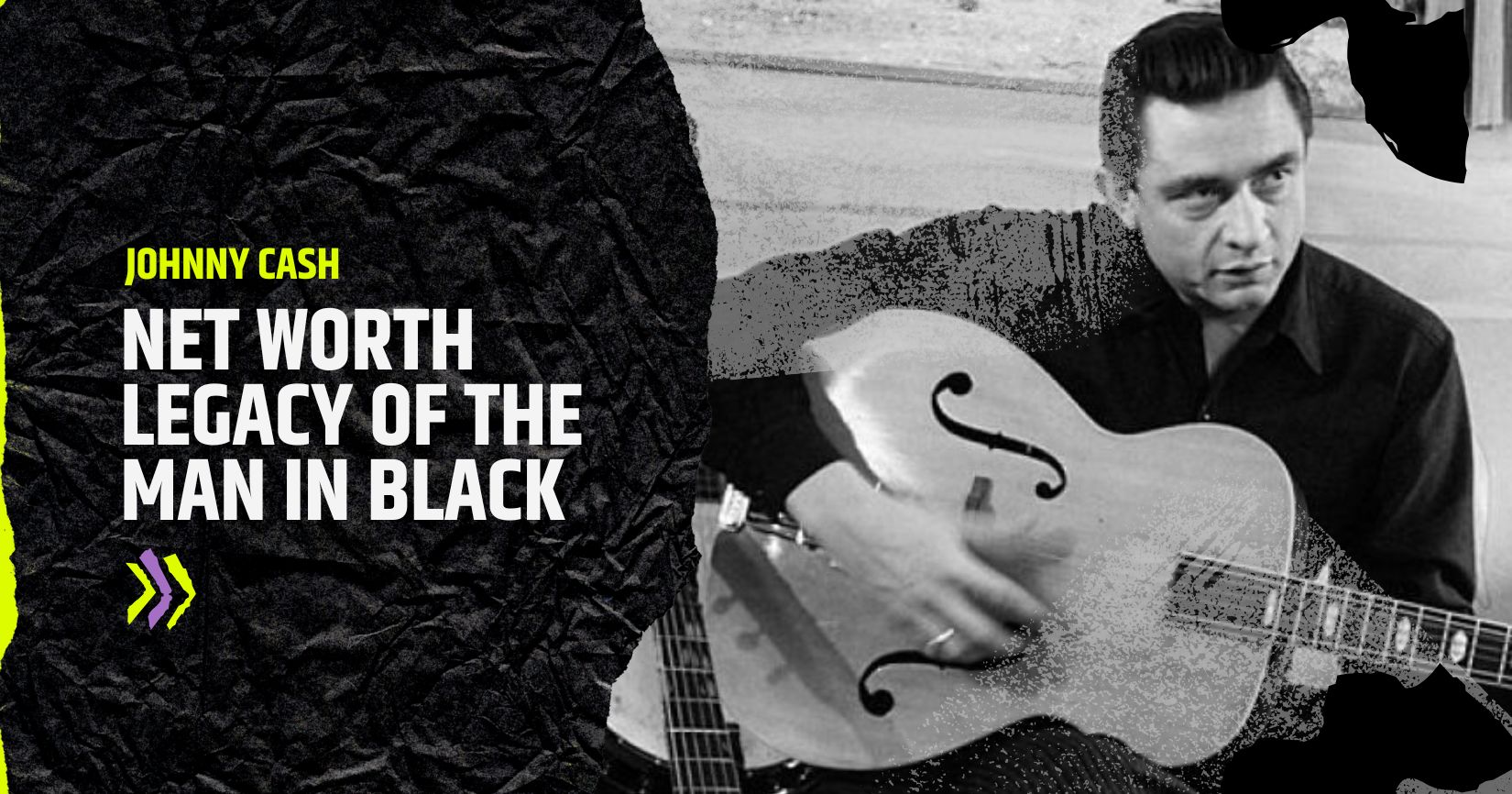Quick Financial Snapshot of Johnny Cash
| Category | Details |
| Full Name | J.R. Cash (Johnny Cash) |
| Net Worth | $60 Million |
| Born | February 26, 1932, Kingsland, Arkansas |
| Passed Away | September 12, 2003 |
| Primary Income Source | Music Industry |
Unveiling Johnny Cash’s Remarkable Net Worth
Johnny Cash, born J.R. Cash in the small town of Kingsland, Arkansas, crafted a financial legacy that continues to resonate decades after his passing. His estimated net worth of $60 million stands as a testament to his unparalleled influence in the music industry. From humble beginnings to becoming a cultural icon, Cash’s financial journey mirrors the grit and authenticity of his legendary music.
Early Financial Struggles and Turning Points
Johnny Cash was born into poverty in Kingsland, Arkansas, as J.R. Cash. Raised during the Great Depression, his family struggled to make ends meet, working as sharecroppers. Despite financial hardships, Cash’s passion for music became his beacon of hope.
Legacy as One of Music’s Most Iconic Figures
Cash’s journey from a struggling youth to a global icon exemplifies the American dream. His unique voice and storytelling abilities carved a niche in country music, and his success laid the foundation for a long-lasting financial legacy.
The Financial Roots: From Poverty to Prosperity
Growing up during the Great Depression, Johnny Cash – born to Carrie Cloveree and Ray Cash – emerged from a challenging background to become one of the most financially successful musicians of his time. His mixed heritage of English, Scottish, and Cherokee ancestry fueled a unique artistic perspective that translated into remarkable commercial success.
Humble Beginnings in Kingsland, Arkansas
Cash’s childhood was marked by adversity. His family’s economic struggles shaped his resilience and desire for success. These formative years influenced his songwriting, adding authenticity to his music.
Building a Career in Country Music
Cash’s breakthrough came with his move to Memphis, where he signed with Sun Records. Hits like Cry! Cry! Cry! launched his career, providing his first substantial earnings and setting the stage for future success.
Record Sales: The Foundation of Wealth

Cash’s financial empire was built on an extraordinary musical foundation. With over 90 million records sold worldwide, his discography became a powerful wealth generator. Iconic albums from the 1950s and 1960s, including landmark recordings like I Walk the Line and American Recordings, consistently drove his financial success.
Key Album Sales Breakdown
| Album | Estimated Sales | Notable Impact |
| I Walk the Line | 10+ Million | Career Breakthrough |
| Folsom Prison Blues | 5+ Million | Cultural Phenomenon |
| American Recordings | 3+ Million | Late Career Renaissance |
Best-Selling Albums and Singles
Johnny Cash’s record sales surpass 90 million copies worldwide, making him one of the best-selling artists of all time. Albums like At Folsom Prison and American IV: The Man Comes Around solidified his commercial success.
Worldwide Record Sales Milestone
In the 1950s and 1960s, Cash released multiple chart-topping hits, with songs like I Walk the Line reaching millions of listeners. These sales became a cornerstone of his wealth, ensuring consistent revenue through royalties.
Musical Earnings: Beyond Album Sales
Cash’s financial acumen extended far beyond traditional record sales. His songwriting prowess – with over 1,000 songs written – created multiple revenue streams. Tracks like Ring of Fire and Get Rhythm continued generating royalties long after their initial release, demonstrating the enduring financial value of his musical catalog.
Royalties from Iconic Tracks
Hits like Ring of Fire and Folsom Prison Blues continued to generate income long after their release. These royalties came from airplay, licensing for movies, and commercials, showcasing the lasting impact of his music.
Revenue from Songwriting Credits
Cash wrote over 1,000 songs during his lifetime, contributing significantly to his earnings. His ability to connect with audiences through powerful lyrics created a legacy of timeless compositions.
- Read More: Chavela Vargas Net Worth 2024: The Extraordinary Financial Legacy of a Ranchera Music Icon
Collaborative Ventures and Supergroup Success

The Highwaymen, featuring Cash alongside Waylon Jennings, Willie Nelson, and Kris Kristofferson, represented a strategic financial move. These collaborations expanded his audience and created additional revenue opportunities, showcasing Cash’s ability to leverage artistic partnerships for financial gain.
The Highwaymen’s Financial Impact
As a member of The Highwaymen, alongside Willie Nelson, Waylon Jennings, and Kris Kristofferson, Cash contributed to several successful albums and tours. The group’s fame not only expanded his audience but also added millions to his net worth.
Collaborations with Other Music Legends
Cash’s collaborations with artists like Bob Dylan and June Carter showcased his versatility and kept his music relevant across generations, leading to increased album sales and fan engagement.
Television and Media: Diversifying Income Streams
The Johnny Cash Show (1969-1971) became another significant income source. This variety show not only enhanced his brand but also opened doors to numerous guest appearances and media opportunities. Television became a powerful platform for monetizing his growing popularity.
The Johnny Cash Show’s Popularity and Profits
The Johnny Cash Show aired from 1969 to 1971, offering Cash a platform to showcase his music and bring country to mainstream audiences. The show’s success contributed significantly to his earnings.
Appearances in Films and Guest Spots
Cash made appearances in movies and TV specials, further boosting his income. Documentaries and interviews also played a role in reinforcing his brand.
Activism: Building Brand Value
Cash’s commitment to social causes, particularly prisoner rights and Native American advocacy, transformed his public image. This activism wasn’t just moral – it strategically expanded his fan base and enhanced his marketability, indirectly contributing to his financial success.
Advocacy for Prisoner Rights
Cash’s performances at prisons like Folsom and San Quentin weren’t just iconic moments in music history—they reflected his deep commitment to prisoner rights. His activism drew attention to social issues while endearing him to fans who admired his compassion.
Support for Native American Causes
Cash supported Native American rights through his music and personal advocacy. This alignment with social causes enhanced his brand, attracting a loyal audience that valued his principles.
Concert Tours: Live Performance Revenues

Prison concerts became legendary earning events. These unique performances not only solidified his rebellious image but also generated substantial revenue. Cash’s live tours consistently drew massive audiences, turning his performances into significant financial assets.
Legendary Prison Concerts
His prison concerts were groundbreaking, showcasing his connection to marginalized communities. These performances brought significant media attention and increased album sales.
Global Tours and Audience Reach
Cash toured extensively throughout his career, performing in front of sold-out crowds worldwide. His ability to connect with audiences in diverse cultures further solidified his financial success.
Merchandising and Brand Legacy
Merchandise became another crucial revenue stream. From official albums to branded clothing, the Man in Black image became a marketable brand. Posthumous releases, documentaries, and biopics continue to generate income for his estate.
Cash-Branded Merchandise
From clothing to collectible items, Cash’s brand has become a staple in country music merchandising. Fans continue to purchase items that bear his name and image, adding to his legacy.
Endorsements and Licensing Deals
Cash’s persona and iconic status have been leveraged by brands, leading to lucrative endorsements and product licensing deals.
Posthumous Earnings: A Continuing Financial Story

Even after his passing, Johnny Cash’s financial legacy continues. Ongoing royalties, licensing deals, and continued interest from new generations ensure that his estate remains financially robust.
Ongoing Royalties and Music Sales
After his passing, Cash’s estate continues to benefit from royalties generated by his extensive music catalog. Songs remain in demand for movies, commercials, and streaming services.
Documentaries and Biopics
Films like Walk the Line and documentaries on his life have reignited interest in Cash’s story, contributing to his estate’s financial success.
FAQ’s About Johnny Cash
What was his birth name?
His birth name was J.R. Cash.
What year was he born?
He was born on February 26, 1932.
Did he serve in the military?
Yes, he served in the United States Air Force during the Korean War.
How many children did he have?
He had five children.
What are some of his most famous songs?
Some of his iconic songs include “Folsom Prison Blues,” “I Walk the Line,” and “Ring of Fire.”
Conclusion: A Financial and Musical Icon
Johnny Cash’s $60 million net worth represents more than just monetary success. It symbolizes a remarkable journey of artistic integrity, strategic career moves, and an unparalleled connection with audiences.
From his early days in Kingsland, Arkansas, to becoming a global music phenomenon, Cash transformed personal struggles into a powerful, profitable brand. His financial legacy continues to inspire musicians and entrepreneurs alike.

The admin of Loomspheres.com is a passionate researcher dedicated to providing accurate, insightful biographies and wiki-style content, aiming to educate and inspire users with trustworthy, well-curated historical and biographical information.

3 thoughts on “Johnny Cash Net Worth 2025: The Financial Legacy of the Man in Black”